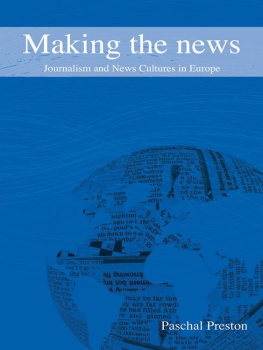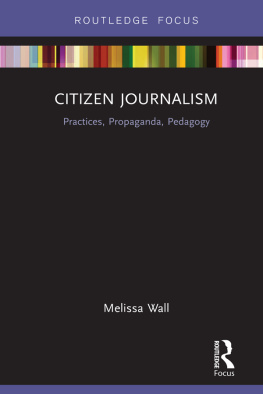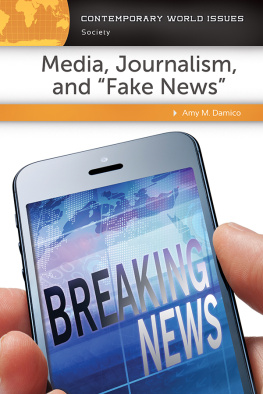Paschal Preston - Making the News: Journalism and News Cultures in Europe
Here you can read online Paschal Preston - Making the News: Journalism and News Cultures in Europe full text of the book (entire story) in english for free. Download pdf and epub, get meaning, cover and reviews about this ebook. year: 2008, publisher: Routledge, genre: Science / Politics. Description of the work, (preface) as well as reviews are available. Best literature library LitArk.com created for fans of good reading and offers a wide selection of genres:
Romance novel
Science fiction
Adventure
Detective
Science
History
Home and family
Prose
Art
Politics
Computer
Non-fiction
Religion
Business
Children
Humor
Choose a favorite category and find really read worthwhile books. Enjoy immersion in the world of imagination, feel the emotions of the characters or learn something new for yourself, make an fascinating discovery.
- Book:Making the News: Journalism and News Cultures in Europe
- Author:
- Publisher:Routledge
- Genre:
- Year:2008
- Rating:3 / 5
- Favourites:Add to favourites
- Your mark:
Making the News: Journalism and News Cultures in Europe: summary, description and annotation
We offer to read an annotation, description, summary or preface (depends on what the author of the book "Making the News: Journalism and News Cultures in Europe" wrote himself). If you haven't found the necessary information about the book — write in the comments, we will try to find it.
Making the News provides a cross-national perspective on key features of journalism and news-making cultures and the changing media landscape in contemporary Europe. .
Focusing on the key trends, practices and issues in contemporary journalism and news cultures, Paschal Preston maps the major contours of change as well as the broader industrial, organizational, institutional and cultural factors shaping journalism practices over the past two decades.
Moving beyond the tendency to focus on journalism trends and newsmaking practices within a single country, Making the News draws on unique, cross-national research examining current journalism practices and related newsmaking cultures in eleven West, Central and East European countries, including in-depth interviews with almost 100 senior journalists and subsequent workshop discussions with other interest groups
Making the News links reviews and discussions of the existing literature to original research engaging with the views and experiences of journalists working at the coal face of contemporary newsmaking practices, to provide an original study and useful student text.
Making the News provides a rare, cross-national perspective on key features of journalism and newsmaking cultures and the changing media landscape in contemporary Europe.Focusing on the key trends, practices and issues in contemporary journalism and news cultures, Paschal Preston maps the major contours of change. Adopting a multi-level approach, he examines individual as well as the broader industrial, organisational, institutional and cultural factors shaping journalism practices over the past two decades.Moving beyond the tendency to focus on journalism trends and newsmaking practices within a single country, Making the News draws on unique, cross-national research examining current journalism practices and related newsmaking cultures in eleven West, Central and East European countries. The study included indepth interviews with almost hundred senior journalists and subsequent workshop discussions with other interest groupsMaking the News links reviews and discussions of the existing literature to original research engaging with the views and experiences of journalists working at the coal face of contemporary newsmaking practices, to provide an original study and useful student text.Paschal Preston is Head of the School of Communication and founder of the Communication, Technology and Culture (COMTEC) research unit, Dublin City University. Previous publications include Reshaping Communications: Technology, Information and Social Change (2001) and Democracy and Communication in the New Europe: Change and Continuity in East and West (1995).Paschal Preston: author's other books
Who wrote Making the News: Journalism and News Cultures in Europe? Find out the surname, the name of the author of the book and a list of all author's works by series.






